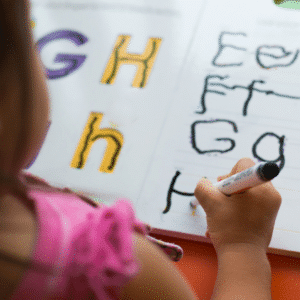
7 Creative Writing Tools For Dyslexic Kids
Dyslexia is a language-based learning disability which makes it difficult for people to deal with certain language skills, especially writing and reading. Around 10% of people in the UK have dyslexia and if your kid is one of those people you should start looking for interesting and effective ways to help them. Luckily there are lots of creative tools that can help kids with dyslexia.
To help you out we’ve created a list of 7 creative writing tools for dyslexic kids so just keep reading to learn about the interesting methods for helping your kid deal with this learning difficulty.
Here we take a closer look.
When you’re trying to help your kids with dyslexia improve their writing skills you should try to make it fun for them. Learning gamification should be one of your choices because it is really motivating for kids. Crazy Cursive Letters is definitely an app that can help.
It’s designed for kids 6-8 and here’s what it offers:
Kids can play the game and improve their cursive writing while adding their own words making it really fun.
Children want to be in charge of their learning and writing process and they can be with the Speechnotes app. The app is very simple to use so even the younger kids will master it in minutes.
Here are some ways dyslexic kids can benefit from the app:
Kids can have fun saying phrases that come to their mind and having them typed out immediately making it the perfect spelling assistant.
Another brilliant app that helps dyslexic kids practice learning the phonetics of letters, spelling and writing is the Montessori Words app because it’s another gamified app it allows kids to:
The app is simple to use and has a colourful fun layout with sound effects and great design so your kids will love it.
Helping your kids write means helping them organize their thoughts and turn them into words. Mind mapping is a method many parents use to help their dyslexic kids prepare for a writing practice session because mind mapping is a visual representation of ideas and here’s how it works.
For dyslexic kids you could instruct them to draw the ideas that are in the bubbles which then makes the preparation step easier. Once they create their mind map they’ll be attempting to write about the ideas from each of the bubbles.
Meaning children only need to focus on writing since the ideas are already defined and prepared.
Another highly appreciated and popular app for helping children deal with writing and reading problems is the Dyslexia Quest.
The fun aspect of it will make sure your kids listen to you and accept practising writing without complaining.
The app offers help with:
By playing this game children slowly progress and work on polishing the skills that will help them write better whilst also having fun.
When your kid is dealing with dyslexia and finding it hard to read and write on their own you could consider using the help of an audiobook. Audiobooks will provide the help they need to follow the reading materials at their own pace and even practice writing afterwards.
This way they’ll be able to pause, repeat, and slow down whenever they feel the need to. After successfully reading a short segment of the book they can try and copy it on a separate piece of paper.
For older kids who’ve already acquired certain writing skills finding a basic spell online can be extremely helpful.
Allow them to type the text directly into the spell checker like Grammarly and it will automatically find and mark their spelling mistakes.
Also an online writing service such as Get Good Grade can help dyslexic kids with writing more demanding pieces of text. It can assess and proofread a larger piece of written content and give feedback to your kids on how they did.
That allows you to work on it and improve your skills in time. It’s important that you give your best to help your kids learn and practice writing creatively enabling them to make baby steps in their progress.
We hope the creative writing tools for kids we’ve shared above will make it easier for you to help your kids learn easier and better. Use the tools you like the most and see how your kids improve their writing skills with them.
7 Creative Writing Tools For Dyslexic Kids.
Check out one of Jessica’s other blogs – writing activities for kids.
Jessica Fender is a professional writer and educational blogger at EssayShark, an aggregator for useful college resources and websites. She enjoys sharing her ideas to make writing and learning fun.
Sensory Matters Podcast
Free Sensory Support Community
Can Chewigems Help Keep Your Teeth Clean?